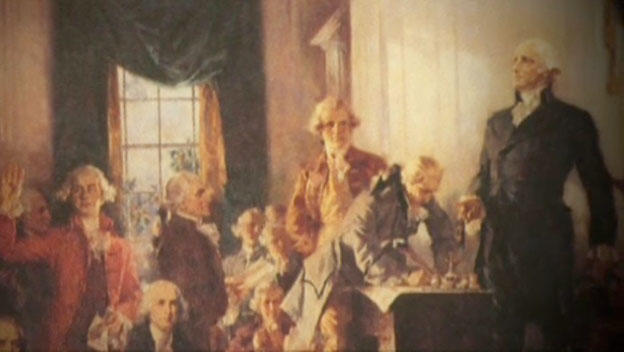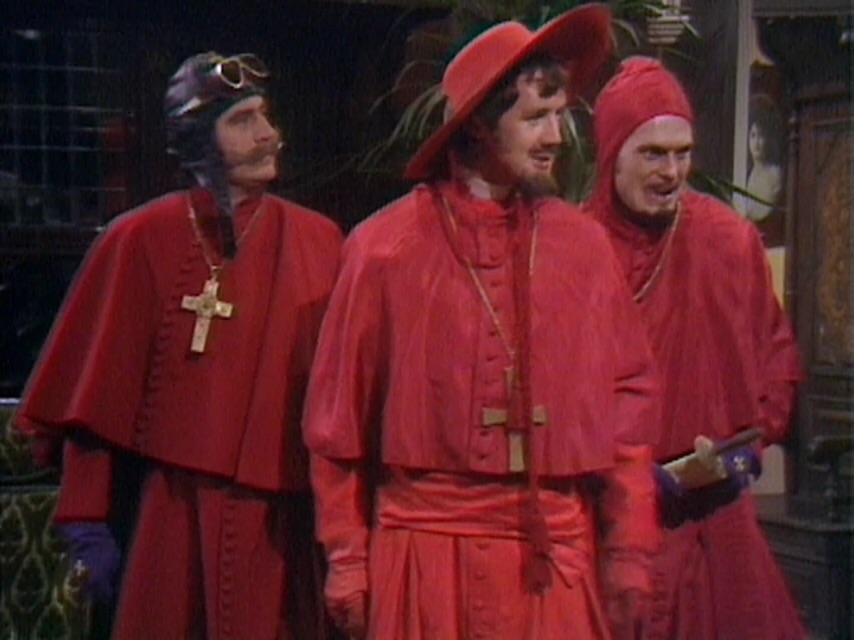Digital conditions, not competing intellectuals, will make it so.
Common Good Originalism

A jurisprudence for all seasons—especially ours.
My friend Adrian Vermeule, a Harvard Law School professor, administrative law scholar, and public intellectual, has fired quite the salvo. With its call for a new “common good constitutionalism,” his now-infamous essay, “Beyond Originalism,” issues the single most provocative call to rethink conservative constitutional jurisprudence in a generation.
Opening the Overton Window
Vermeule argues that originalism, which has various sub-genres but holds that the Constitution’s original public meaning is both fixed and binding, “has now outlived its utility.”
In its wake should come an unabashedly substantive constitutional exegesis “based on the principles that government helps direct persons, associations, and society generally toward the common good, and that strong rule in the interest of attaining the common good is entirely legitimate.” Specifically, this interpretive methodology “should take as its starting point substantive moral principles that conduce to the common good, principles that officials (including, but by no means limited to, judges) should read into the majestic generalities and ambiguities of the written Constitution.”
The whole essay is a beneficial exercise in Overton window-shifting, one that ought to force many to refine their arguments and retire their bromides. Already, it has spawned a veritable cottage industry of center–right rejoinders. The responses vary in tone from the more deliberate to the more pearl-clutching. (And already, Vermeule has replied to his critics, in rather sardonic fashion.) Those critics failing to seriously grapple with Vermeule’s argument—and the broader project of urging political conservatives to rethink fidelity to originalism—are out of step with the trajectory of conservatism.
The “New Right,” broadly opposed to the pre-2016 “dead consensus” and arrayed, with Sohrab Ahmari, “Against David French-Ism,” has fueled a major intellectual ferment. Baby-faced senators like Josh Hawley and Tom Cotton now openly challenge neoliberal consensus. Marco Rubio now touts the merits of “common good capitalism.” Think tankers like Oren Cass aim to restore a conservative economic order unconstrained by “market fundamentalism.” Nationalism and an appreciation for the virtues of sovereignty are on the ascendant.
Within this broader context of conservatives reconsidering orthodoxies, Vermeule’s proposal fits quite neatly. What Georgetown University Law Center Professor Randy Barnett calls a “disturbance in the originalist force by a few, mostly younger, socially conservative scholars and activists” could evolve into a more thorough exodus away from originalism if, as is heavily rumored, putative originalist Justice Neil Gorsuch sides with his progressive colleagues this term by reading into Title VII legal protection the biological and linguistic lie that is “transgenderism.”
Overshooting the Mark
I would conservatively estimate I am closer to Vermeule’s position than 95% of Federalist Society-trained top law school graduates from my social and professional milieu.
I worry greatly about the Title VII case. As a hopeless pessimist on all things judicial branch-related, moreover, I also share Vermeule’s palpable distress with the relatively minimal Supreme Court victories since the earnest commencement of the modern originalist project nearly four decades ago. I further share much (although certainly not all) of Vermeule’s agenda, especially our jointly held substantive prioritization of solidarity, order, and, perhaps above all, a “candid willingness to ‘legislate morality.’” Finally, I share Vermeule’s vision of a conservative future which relies more on the assertive sword of “Ahmari-ism” than on the defensive shield of “French-ism.”
But I still cannot fully endorse Vermeule’s proposal. There is much sclerosis that Vermeule aptly perceives and diagnoses, but for reasons of both theoretical legitimacy and that great Burkean virtue, prudence, the proposed remedy is a bit too strong for the malady. I will very briefly sketch the outlines of one possible alternative framework—one that is legitimate, prudent, and aligns neatly with the zeitgeist: “common good originalism.”
What Vermeule Gets Right
I am in lockstep with Vermeule on this much: human beings are moral creatures, and to deny us the ability to advance overtly moralistic argumentation is an attempt to deprive us of the very faculties that make us human in the first instance. There is no intuitive reason to cabin such an overarching claim to merely the denizens of the “political” branches of the U.S. government—Congress and the presidency. On the contrary, as leading Straussians like Hadley Arkes and the late Harry Jaffa have long argued, and as Justice Clarence Thomas has intimated himself, natural law is firmly ensconced in the American constitutional tradition.
Nor is this purely a Straussian speculation. Edmund Burke, while more frequently associated with incrementalism and epistemological humility, held the natural law in great esteem and lauded the natural law underpinnings of the English common law. And founders like John Adams and Alexander Hamilton, channeling Burke, understood the American Founding as a restoration of that very centuries-long English constitutional tradition.
Not only is Vermeule right about man’s innate moral nature, but he is right about the concomitant purpose of government: to promote justice, human flourishing, and the common good. Individual liberty, while intrinsically important to a limited extent, is classically understood more crisply as an instrumental means toward these loftier ends. As Aristotle put it in his Politics, after all, “a state exists for the sake of a good life, and not for the sake of life only.” Accordingly, classical liberal pluralistic modalities such as a morally denuded and free speech absolutist “marketplace of ideas,” which Vermeule decries, should indeed be questioned.
The professor is also correct to characterize our constitutional order as prioritizing substantive justice over Enlightenment-era pluralistic proceduralism. James Madison, a classical liberal favorite, would seem to agree, writing in Federalist #57 that the “aim of every political constitution is, or ought to be, first to obtain for rulers men who possess most wisdom to discern, and most virtue to pursue, the common good of the society.”
Pure legal positivism and the elevation of procedure to the complete detriment of substance, most frequently associated with the jurisprudences of the late Judge Robert Bork and the late Justice Antonin Scalia, must be rejected. A true value-neutral jurisprudence is, ultimately, an untenable jurisprudence. To pretend a judge can be morally neutral is to make the same error as to pretend a news reporter can be politically neutral: it is to deny human nature itself.
What Vermeule Gets Wrong
Vermeule’s essay gets a bit muddled when it moves beyond the more abstract realm of political theory into the more concrete realm of articulating a cogent interpretive methodology of constitutional law. As my former Fifth Circuit co-clerk John Ehrett quickly noted in the aftermath of the essay, Vermeule’s thesis has an “oath-breaking problem.”
Specifically, Article VI of the Constitution commands that all political and judicial officers of the United States “shall be bound by oath or affirmation, to support this Constitution.” The modern incarnation of the federal judicial oath of office, statutorily codified in 28 USC §453, concludes with that most solemn of four-word pledges: “So help me God.” As Ehrett wrote, “the Creator of heaven and earth is invoked as a witness to the solemn act, with the implication that His judgment will follow if the oath is violated.”
To solemnly vow to support the Constitution, so help you God, is to make an unbreakable commitment to faithfully interpret and dutifully execute the Constitution’s commands. Unless we accept the Marxist-inspired “critical legal studies” thesis that all text is hopelessly indeterminate, furthermore, we must accept that words maintain generally durable meanings over time.
If words maintain fixed meanings over time, then to “support” a text necessarily entails an inquiry into what words meant at the time they were enacted into law. Trite though the analogy may seem, it is perhaps still illustrative to compare the basic exercise here to the common law of contracts—the key underlying purpose of the latter being to accomplish the intent of the parties as expressed in the contract.
If one believes in basic textual determinacy, then one should agree with Justice Thomas’s 1996 formulation that a proper “vision of…judging is unabashedly based on the proposition that there are right and wrong answers to legal questions.” Accepting textual determinacy, or even something closely approximating textual determinacy, originalism (or some sub-genre thereof) does not amount to one among many competing methods of constitutional interpretation for United States legislators, executive branch officials, and judges. It is a job requirement—a necessary condition without which one would be remiss to take that solemn oath.
As constitutional scholar Michael Stokes Paulsen frames it, originalism is “the only method consistent with the very idea of written constitutionalism.”
Common Good Originalism
There have always been competing flavors of originalism, and here again I share Vermeule’s distaste for many.
On the one hand, the most banal sort of positivism—the “one man’s vulgarity is another’s lyric” pluralistic argle-bargle Vermeule lambasts and Justice Samuel Alito dismisses in his Snyder v. Phelps (2011) dissent—must be rejected for the moral relativism that it is. On the other hand, we must also reject the donor-class legal libertarianism that relentlessly obsesses about overturning administrative law edicts like Chevron U.S.A. v. National Resources Defense Council (1984) and Auer v. Robbins (1997) but is actively complicit in natural law-subversive, individual autonomy-maximizing cases like Lawrence v. Texas (2003) and Obergefell v. Hodges (2015).
A “common good originalism” is therefore our best path forward. Allow me to briefly sketch the outlines of a framework.
Common good originalism rejects the legal Right’s decades-long infatuation with the great “strict constructionist” founding-era Virginians, Madison and Jefferson, preferring instead the constitutional outlook of Hamilton, Burke’s heir apparent on American soil. Hamilton, like Burke, was not merely a staunch nationalist who preferred learned empiricism to rationalist abstraction—he was also the “original originalist” because of the strong view he took of English common law’s role in early-republic American jurisprudence. “I believe the British government forms the best model the world ever produced,” Hamilton told the delegates of the 1787 constitutional convention.
I suspect Vermeule, who in 2015 dismissed the siren song of the legal “straitjacket” in favor of a “comfortable garment that allows flexibility while retaining its basic shape,” might like to claim the expansive constructionist Hamilton as his own. But that would be mistaken. Hamilton’s respect for constitutional text, admiration for English constitutionalism, and appreciation of that constitutionalism’s roots in the natural law all make him a better fit for the Anglo-American conservative tradition than for Vermeule’s more Continental European vision of governance.
Hamilton’s commitment to constitutional originalism is seen most explicitly in his 1791 Opinion as to the Constitutionality of the Bank of the United States: “whatever may have been the intention of the framers of a constitution, or of a law, that intention is to be sought for in the instrument itself, according to the usual and established rules of construction.” And it was on that precise issue, the constitutionality of a national bank, that Hamiltonian originalism—as applied to the Necessary and Proper Clause of Article I, §8, the interpretation of which bitterly divided Hamilton and the Virginians—was most clearly vindicated.
In the landmark case of McCulloch v. Maryland (1819), Chief Justice John Marshall famously rejected the “absolute physical necessity” interpretation of the Necessary and Proper Clause dictated by Madison’s strict construction, instead holding for Hamilton’s vision: “Let the end be legitimate, let it be within the scope of the Constitution, and all means which are appropriate, which are plainly adapted to that end, which are not prohibited, but consist with the letter and spirit of the Constitution, are Constitutional.” The correctness of Marshall’s opinion is universally recognized in originalist circles; in his Sabri v. United States (2004) concurrence, even Justice Thomas opined that Marshall “carefully and effectively refuted” the strict “absolute necessity” construction.
What’s more, Chief Justice Marshall’s opinion refers expressly to the “public good” and relies more broadly upon an unspoken natural law motif. Judge Bork himself once noted that a “method of reasoning from the implications of written constitutional principles to subsidiary principles is indispensable and was brilliantly demonstrated by Marshall’s opinion in McCulloch v. Maryland.” This prudential, nationalist, common good-centric jurisprudence, and not the strict constructionism and philosophical rationalism run amok of the Virginians, remains today our true conservative inheritance.
Common good originalism should adopt the conservatism of Hamilton, Marshall, and Justice Joseph Story as its jurisprudential lodestar. The interstices naturally permitted by a more expansive constructionism will, assuredly, provide ample room for jurists to deploy substantive moral argumentation along the lines favored by scholars like Jaffa and Arkes. Furthermore, by rejecting hyper-literalist free speech absolutism, common good originalism permits (within reason) natural law-undergirded arguments about the moral worth of one’s speech, such as Alito’s dissent in Snyder: “Our profound national commitment to free and open debate is not a license for the vicious verbal assault that occurred in this case.”
Common good originalism also rejects natural law-subversive “originalist” claims about constitutionally mandated marriage redefinition that would undermine the common good, risible anti-sovereigntist “textualism” claims about constitutionally mandated open borders that would wreak havoc upon the common good, and so forth.
This is only a bare-bones beginning. And I know, of course, that I will not persuade Vermeule himself. But my aim is to lay out a framework upon which to build an assertive, moralistic, Burkean/Hamiltonian conservative jurisprudence. This jurisprudence is also legitimate, from a positive law perspective, because it is rooted in (an expansive construction of) the constitutional text and thereby avoids the “oath-breaking problem” posed by Article VI of the Constitution.
Methodological legitimacy is not just intrinsically important for those of us who generally think highly, as a normative matter, of the charter that emerged from the 1787 constitutional convention in Philadelphia. It is also prudentially important, insofar as it better enables evangelists of a theory of constitutional interpretation to reach beyond the echo chamber and attract new converts. It is based on both the reality of our regime form and the role of judges in addressing the great questions of our era.
In 1982, the year in which he helped found the Federalist Society at my law school alma mater, Antonin Scalia—for whom Adrian Vermeule would later clerk on the Supreme Court—said: “I urge you, then—as Hamilton would have urged you—to keep in mind that the federal government is not bad but good. The trick is to use it wisely.” With appropriate subsequent explication, I believe the framework of common good originalism provides us the opportunity to do precisely that.
The American Mind presents a range of perspectives. Views are writers’ own and do not necessarily represent those of The Claremont Institute.
The American Mind is a publication of the Claremont Institute, a non-profit 501(c)(3) organization, dedicated to restoring the principles of the American Founding to their rightful, preeminent authority in our national life. Interested in supporting our work? Gifts to the Claremont Institute are tax-deductible.
Liberalism Is the Politics of Fear.
More than abstraction is at stake.
"Real Originalism has never been tried..."
In its effects, it is synonymous with liberalism.
Only a dark theology can baptize the administrative state.






